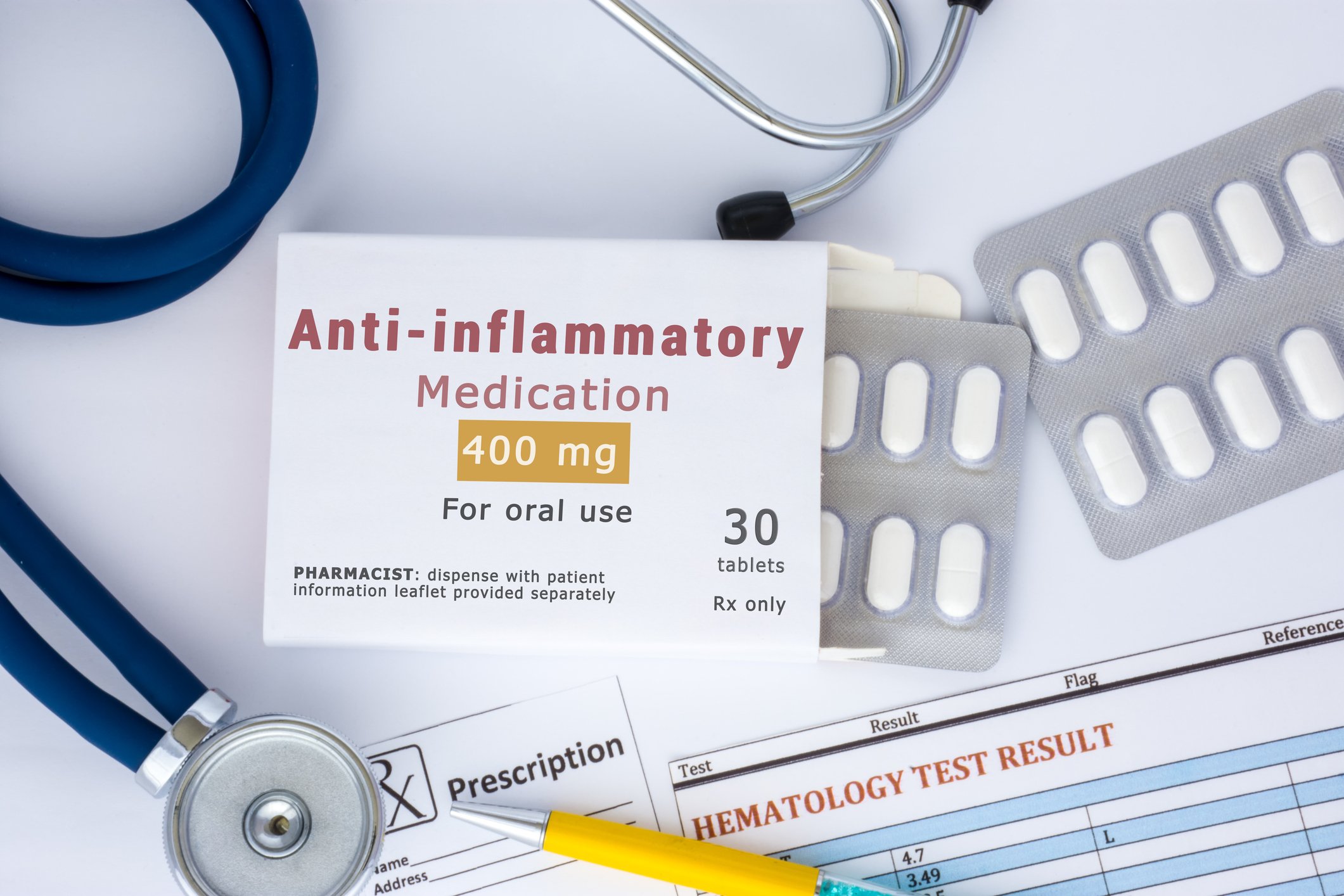What Is the Strongest Anti-Inflammatory Medication?
By Jillian Foglesong Stabile, MD, FAAFP, DABOM
August 27, 2025
Prescription Drugs, Your Health & Wellness

What Is the Strongest Anti-Inflammatory Medication?
Inflammation is a normal bodily response to injury and illness, allowing your body to increase blood flow to the affected area, bringing white blood cells and factors that promote healing. Inflammation can be acute in response to trauma and other factors or chronic, lasting years. But inflammation can be painful. When you’re faced with the pain associated with inflammation, you may be wondering what the strongest anti-inflammatory medication is. This guide will discuss your options for anti-inflammatory drugs and discuss some of the factors that may help you choose the right medication.
What is the strongest anti-inflammatory medication?
When it comes to anti-inflammatory medication, there are many choices, and they vary in strength. Each person’s response to medication is different, so what works best for one person may be different than what works best for another.
Anti-inflammatory drugs list
Several common anti-inflammatory drugs are available for use. Some of these are available over-the-counter, while others are available only by prescription. The most commonly used anti-inflammatory medications are nonsteroidal anti-inflammatory drugs (NSAIDs). The following table lists common NSAIDs and their doses.
| Medication | Drug Class | Common Dosage (adults) | WellRx Savings Card |
| Diclofenac | Acetic acid | 50-75 mg twice daily, also available as a topical gel | WellRx Savings Card |
| Etodolac | Acetic acid | 300-500 mg twice daily | WellRx Savings Card |
| Ibuprofen | Propionic acid | 200-800 mg 3X daily | WellRx Savings Card |
| Indomethacin | Acetic acid | 25-50 mg 2-3 X daily | WellRx Savings Card |
| Ketoprofen | Propionic acid | 50-75 mg 3X daily | WellRx Savings Card |
| Ketorolac | Pyrrolo-pyrrole | 10 mg every 4-6 hrs | WellRx Savings Card |
| Meloxicam | Enolic acid | 7.5-15 mg daily | WellRx Savings Card |
| Nabumetone | Naphthylalanine | 1,000 mg up to twice daily | WellRx Savings Card |
| Naproxen | Propionic acid | 375-500 mg twice daily | WellRx Savings Card |
| Oxaprozin | Propionic acid | 1200 mg daily | WellRx Savings Card |
| Celecoxib | Cox-2 inhibitor | 200 mg daily | WellRx Savings Card |
| Aspirin | Acetylsalicylic acid |
This list is not exhaustive, and other anti-inflammatory medications may also be used. This list includes many of the common anti-inflammatory medications. Some anti-inflammatory medications have IV preparations that are used in hospital settings.
When to use anti-inflammatories
The Food and Drug Administration (FDA) has approved non-steroidal anti-inflammatory pills for fever, pain, and inflammation. Providers often recommend these medications for menstrual pain, migraines, arthritis, gout, muscle pain, and even trauma.
Types of anti-inflammatory medicines
Anti-inflammatory medications can be divided into steroidal anti-inflammatory and non-steroidal anti-inflammatory medications. Non-steroidal anti-inflammatory drugs block an enzyme known as cyclooxygenase (COX), decreasing the inflammatory response. Steroid medications, such as prednisone, work by blocking a different enzyme in the inflammatory response known as phospholipase A1 (PLA2). Steroids, most often corticosteroids, are sometimes used to treat other types of inflammatory conditions, such as asthma and eczema. Corticosteroids are also frequently used for allergic reactions because they can decrease the immune response.
What over-the-counter medicine is good for inflammation?
Many NSAIDs are available over the counter. In fact, most of the medications available over the counter for pain are in the NSAID class and can treat inflammation. The exception to this is acetaminophen, which may be used for pain or fever but is not indicated to treat inflammation. Aspirin, ibuprofen, and naproxen are all available over-the-counter as oral medications, and diclofenac is available in a topical preparation over the counter.
What are the strongest anti-inflammatory pills?
Of the over-the-counter anti-inflammatory pills available, naproxen has the longest duration of action. Naproxen can be dosed twice daily while other over-the-counter anti-inflammatories available over the counter are dosed up to 3 or more times per day. Of the prescription anti-inflammatory pills, oxaprozin and meloxicam are both dosed daily and have a longer duration of action than their counterparts. Ultimately, the best medicine for inflammation is the one that improves your symptoms while minimizing the side effects that you experience.
How fast does medicine for inflammation work?
The length of time it takes for a medication to work for inflammation depends on the specific medication. Many NSAIDs begin to work within 20-30 minutes for pain control, but they may take as long as a few weeks to reach maximum effect for chronic inflammation conditions such as arthritis. Steroid medications work more quickly. Oral corticosteroids may start to relieve inflammation within 24 hours and begin to offer relief within a few days. Your healthcare provider may also inject steroids directly into your joint. Injections may start to take effect within a few days, but may not reach their maximum benefit for several weeks.
How often can you take medicine for inflammation?
OTC anti-inflammatory medicines are usually dosed two to four times daily. Prescription medications are dosed one to four times daily, depending on the medication. Most OTC anti-inflammatory medicines are intended for short-term use unless directed to take them for longer by your healthcare provider. Corticosteroids can cause side effects if used for long periods, so your healthcare provider may not recommend you stay on these long-term.
Natural remedies for inflammation
There are several potential remedies that can help alleviate inflammation. Some foods have been shown to decrease inflammation. The Mediterranean diet is often a good option for individuals seeking to reduce inflammation. Some of these foods include:
- Olive oil
- Leafy greens
- Nuts
- Fatty fish
- Certain fruits
You can also naturally decrease inflammation by avoiding foods that promote it, such as processed and fried foods, refined carbohydrates, and added sugars. Several supplements may be beneficial for inflammation. A 2010 study that evaluated natural compounds for inflammation and pain relief found evidence that several supplements showed promise for treating pain and inflammation. These included:
- Omega-3 fatty acids
- White willow bark
- Curcumin (turmeric)
- Green tea
- Maritime pine park
- Boswellia serrata resin (Frankincense)
- Resveratrol
- Cat’s claw
- Capsaicin
Before starting any supplement or natural compound, you should talk with your healthcare provider to make sure that these alternatives will not interact with your other health conditions or medications.
What to take for inflammation? Choosing the best anti-inflammatory medication
Choosing the best anti-inflammatory medication for you requires considering your unique health conditions and needs. There are many factors to consider:
- Age – Some side effects of NSAIDs are more common in people over 65.
- Health conditions – NSAIDs can affect blood pressure, cardiovascular health, kidney function, and the stomach lining. Some people with chronic health conditions should avoid these medications.
- Duration of inflammation – You should only take OTC anti-inflammatory medications in the short term unless directed otherwise by a healthcare provider. The duration of pain and inflammation often affects which medications are appropriate
- Cause of inflammation – The underlying condition that is causing the inflammation may determine which medication is most appropriate. Autoimmune conditions such as rheumatoid arthritis may require different treatment than osteoarthritis.
Get your free ScriptSave® WellRx account and start saving on your medications
Medications are expensive, and their costs can vary significantly between pharmacies, even those located across the street. If you are experiencing a painful or inflammatory condition or if your healthcare provider has recommended medication, you may be wondering how to save money on your prescriptions. Consider visiting us at WellRx.com. Some people save a little. Some people save a lot. Prices vary across zip codes. Even pharmacies across the street from each other can have huge price differences. Our goal is to bring transparency to prescription medication pricing, enabling consumers to keep more money in their pockets. ScriptSave has been helping consumers save on their prescriptions for 25 years.
FAQs related to anti-inflammatory medications
What are anti-inflammatory drugs?
Anti-inflammatory drugs are medications that act on enzyme pathways to decrease inflammation in your body. The two most common groups are NSAIDs and corticosteroids.
What is the strongest NSAID?
Naproxen is the longest-acting NSAID available OTC. Meloxicam and oxaprozin are the longest-acting prescription NSAIDs. Ultimately, each person responds differently to different medications.
What is the most effective anti-inflammatory?
The most effective anti-inflammatory is the one that relieves your symptoms while minimizing side effects. Corticosteroids are often stronger and more effective than NSAIDs, but can only be used for short periods due to the potential long-term side effects. Naproxen is often one of the more effective over-the-counter (OTC) medications due to its longer-acting duration, requiring fewer doses.
Is there a stronger anti-inflammatory than ibuprofen?
Several anti-inflammatories may be stronger than ibuprofen. Naproxen is considered one of the strongest OTC medications because it is longer acting than ibuprofen. Other medications such as Celebrex, diclofenac, indomethacin, and meloxicam are also longer acting and may be stronger than ibuprofen. These anti-inflammatory medications are available by prescription only in their oral form. Diclofenac is also available as an OTC topical medication.
Are there any alternatives to taking anti-inflammatory medications?
There are several alternatives to taking anti-inflammatory medications, including a balanced diet, physical therapy, and various supplements and natural remedies that have been shown to offer some benefit in treating inflammation and pain. Some inflammatory conditions, such as arthritis, may require surgery for long-term relief.
References
https://my.clevelandclinic.org/health/symptoms/21660-inflammation
https://www.ncbi.nlm.nih.gov/books/NBK493173/
https://www.ncbi.nlm.nih.gov/books/NBK547742/
https://www.ncbi.nlm.nih.gov/books/NBK534809/
https://my.clevelandclinic.org/health/treatments/corticosteroids-glucocorticoids
https://www.ncbi.nlm.nih.gov/books/NBK482369/
https://www.ncbi.nlm.nih.gov/books/NBK525965/
https://www.singlecare.com/blog/how-long-does-it-take-for-ibuprofen-to-work
https://www.nhs.uk/conditions/steroid-injections/
https://www.health.harvard.edu/staying-healthy/foods-that-fight-inflammation
Recommended Articles









